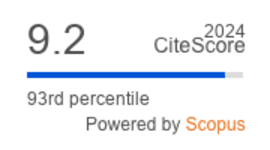Environmental Metagenomic Analysis of "ESKAPE" Pathogens in the Pediatric Intensive Care Unit of General Hospital Yogyakarta Indonesia
DOI:
https://doi.org/10.36877/pmmb.a0000398Abstract
Healthcare-associated infections (HAIs) are infections that occur while receiving health care, develop in a hospital or other healthcare facility, and first appear 48 hours or more after hospital admission, or within 30 days after having received health care. HAIs are linked to high mortality rates, prolonged stays, increased hospital overhead costs, and financial burdens on patients. Bacterial transmission from medical personnel or the environment, or patient-to-patient contact are all potential causes of these infections. A molecular epidemiology approach is needed to examine the contribution of risk factors and the distribution of "ESKAPE" pathogens within the hospital environment. In this study, we conducted a comprehensive analysis of the distribution of ESKAPE bacterial pathogens in the environment of pediatric intensive care units over a 30-day time interval using shotgun metagenomics. We collected samples from handwashing sinks, the floor around patients, and ventilator screens and tubes in the pediatric intensive care unit (PICU) of General Hospital, Yogyakarta, Indonesia in March 2022. We determine taxonomic profiles and also detect resistome, and virulome distribution of ESKAPE pathogens on various environmental surfaces through shotgun metagenomic sequencing. The microbiomes of the floor, sink, and mechanical ventilator exhibit a diverse composition of microbial communities, featuring significant species richness based on Shannon and Simpson’s index. These microbiomes encompass a wide array of microbial species, including ESKAPE bacterial pathogens, as well as profiles related to resistome and virulome. ESKAPE pathogens, especially Acinetobacter baumannii, predominated in the PICU environment. Most virulome have been associated with metabolism/nutrition and adhesion. Noteworthy findings include resistome genes characterized by mechanisms like efflux pumps (MDR) and alterations in antibiotic targets.
Downloads
Published
How to Cite
Issue
Section
License
Copyright (c) 2024 Ludhang Pradipta Rizki, Indah Kartika Murni, Abu Tholib Aman, Titik Nuryastuti

This work is licensed under a Creative Commons Attribution-NonCommercial 4.0 International License.
Author(s) shall retain the copyright of their work and grant the Journal/Publisher right for the first publication with the work simultaneously licensed under:
Creative Commons Attribution-NonCommercial 4.0 International (CC BY-NC 4.0). This license allows for the copying, distribution and transmission of the work, provided the correct attribution of the original creator is stated. Adaptation and remixing are also permitted.

This broad license intends to facilitate free access to, as well as the unrestricted reuse of, original works of all types for non-commercial purposes.
The author(s) permits HH Publisher to publish this article that has not been submitted elsewhere.



.png)

.jpg)
